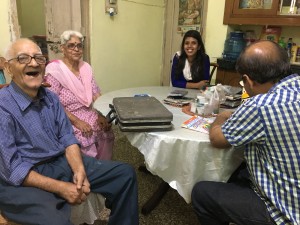Contact Us




One of the biggest challenges for people who are taking care of a spouse or elderly parent with any form of dementia is dealing with sudden outbursts of agitation and aggression. Most people with dementia undergo behavioral changes during the course of the disease. Depending on their personalities and experiences they may become anxious or repeat the same question or activity many times.
These changes can be stressful for caregivers and are very unpredictable. As the disease progresses, your loved one’s behavior may seem inappropriate, childlike or impulsive. Aggression is one common behavior among dementia patients. Cursing, hitting, grabbing, kicking, pushing, throwing things, scratching, screaming, biting, and making strange noises are some ways through which they express their negative emotion.
“The public thinks Alzheimer’s is a memory disease” says Dr. Ramzi Hajjar, a geriatrician at St. Louis University in Missouri. “But, in fact, there are lots of neuropsychiatric symptoms. Alzheimer’s patients often develop delusions. They think their family is stealing things from them, for example. And they get very aggressive and irritable towards their spouse.” He adds that the family needs to remember that it is the disease that is causing the behavior. “The children always want to take it personally, which causes unnecessary anxiety,” Hajjar says.
Although the behavior of a person with dementia can be unpredictable it can be hard to understand why they act the way they do. If we see the explanation is attributable to their disease and the changes it causes in the brain.
Understanding the aggression
Anticipating behavioral changes and understanding the causes can help you deal with them more effectively. Most of the times there are certain things that we can say are the “triggers” that brings out aggressive behavior in the patient with dementia. Working and understanding what brings out what sort of behavior from your loved one will help manage the outcomes.
Some of the common triggers are given below:
1) Environmental triggers
Unfamiliar places, loud areas, dark rooms, too cold or hot temperature, etc. can put them in unpleasant environment which can bring out the aggressive side of their nature when they are not able to express. Often the agitation is related to a particular time of the day, especially evenings (Sun Down syndrome).
2) Physiological triggers
The changes that happen in the brain due to the disease also trigger anger for the elderly with dementia. For example
Managing anger in dementia
Once the caregiver has identified and understood what are the things or the “triggers” that bring out the anger in their loved one with dementia, various steps can be taken to avoid them or decrease the frequency. Some of the tips are given below:
For example, if your loved one constantly asks to take them home, trying to just distract him/her may not work. You will not understand what is is the underlying emotion beneath the behavior. Rather you may say something like, “I know you miss your family.” And you can sit with them and talk about the family and probably look through the family album. This way you are accepting their emotion and then distracting them positively.
Dementia is not just a disease of the brain but it also effects a person in whole. Personality changes, they forget, become childlike, sometimes act strange but none of it is predictable, you see it as it comes. As a caregiver it is very stressful to manage so many abrupt shades of one person especially the angry one. But one should never forget, “The disease might hide the person underneath but there’s still a person in there who needs your love and attention” – Jamie Calandriello.
We at Samvedna Care aim to help seniors live happy, active and independent lives, in the comfort of their home and community through interactive caregiving.
Samvedna Care was established in October 2013 with two complementary goals – firstly to provide quality home care services to seniors with limited mobility or dementia and hence social interaction, and secondly to facilitate stimulating community interaction and participation.
Our Dementia Care services are –
At-home services –
Dementia intervention activities by trained Care Specialists (already mentioned above). These services are available in Delhi NCR
More – https://www.samvednacare.com/service/dementia-care
Please call us for more info – Delhi NCR – 98184 21446, 124 4229659
Dementia Support Group –
Our Dementia Support group in Delhi NCR is a platform for caregivers to share feelings and support each other.
Please call us for more info – Delhi NCR – 98184 21446, 124 4229659
Cognitive Wellness Programme, Sector 57 Gurgaon –
Samvedna’s Cognitive Wellness Programme is designed for seniors with mild cognitive impairment, early dementia or Parkinson’s, and elderly lacking in enthusiasm and motivation. The aim is to stimulate the mind of the elderly to slow the progression of the disease or impairment. The sessions are 3 days a week, 11AM-1PM.